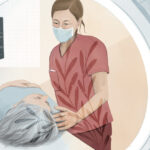Reinstating motivation at the heart of the professions
Reinstating motivation at the heart of the professions
Is it possible to practise our professions in the current health and social service system as “actively engaged” practitioners? If so, under what conditions? These were the questions posed by a researcher specializing in engaged practice, Marianne Beaulieu.
At the outset of her academic career, this researcher who is now an assistant professor in the Faculty of Nursing at Université Laval was interested in how the concept of engaged practice applied in academia. She saw this approach rooted in the values of social justice and active citizenship as a way for teachers and researchers to develop beneficial reciprocal relationships with civil society. In her view, when applied to health and social services, engaged practice is a way of practising one’s profession in accordance with the core motivation of practitioners in this field: to further the well-being of individuals and communities.
Marianne Beaulieu cut right to the chase: the extensive psychological distress reported among personnel in the healthcare system is due to the disconnect between employees’ motivation and their practice in the field, which is experienced as a loss of meaning. “We’ve begun to serve the interests of a system rather than establishing humane relationships,” she noted. “A dehumanizing system fails to properly take into account the desire to help others. This is dangerous, because inducing employees to behave like robots amounts to treating patients like merchandise.”
The researcher stressed that critical judgment is crucial in the field of health and social services, and practitioners must have the necessary latitude to exercise it. When there’s a degree of dissonance between what people are trained to do and their actual practice, or between the requirements of their professional order and the directives of their supervisor, they begin to think they’re not doing a good job. This creates distress.
One of the attractions of the private sector is precisely the prospect of being able to excel at one’s job without so many statistical and administrative constraints. The problem is that not all clients can afford to pay for the time involved.
Three conditions
“Giving practitioners the possibility of making decisions is one way to respect their autonomy and ensure recognition of their work – two conditions that are essential to engaged practice.”
Providing support is the third condition needed for personnel to be actively engaged, according to Marianne Beaulieu. She gave concrete examples such as access to training activities on the latest developments in the various disciplines, or to administrative conditions that facilitate multidisciplinary teamwork and the sharing of expertise. These are the same demands that APTS members consider to be a priority.
The researcher points out that managers also experience a disconnect, as they are forced to comply with directives from above that fly in the face of new management approaches prompting them to be attentive to what their staff is saying.
It would be a mistake to see engaged practice as a concept that’s purely theoretical. Very real issues are raised about employees’ sense of belonging at work, the dehumanization of management practices, questions of power, and pressure. It reveals the contradictions that exist between the demands of managers or the healthcare system and the requirements of rigorous professional practice based on solid evidence.
Marianne Beaulieu intends to pursue her investigations on the relationship between engaged practice, loss of meaning in one’s work, and burnout. In her view, this area of research transcends the boundaries of disciplines and concerns professional orders and unions alike.
“Health and social services should be guided by a holistic vision centred on human beings that extends well beyond a government’s four-year term. We have to fight to overcome the lack of coherence and end the disconnect,” concluded Professor Beaulieu.





